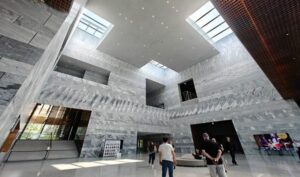Building Standards
European Collaboration in Building Standards
July 1, 2025 by Simon Moore No Comments | Category Building Standards
For almost three decades, representatives of the Scottish building standards community have worked with European colleagues to promote and develop building regulations.
The Consortium of European Building Control is an organisation dedicated to the promotion and sharing of expertise on building control systems across Europe and beyond. The organisation currently comprises 32 member organisations across 22 countries.
Members represent those who produce building regulations and those who verify/enforce those regulations, both public and private sector organisations.
Member organisations meet twice a year to share information and discuss topics of mutual interest. Scotland hosted a meeting in May 2024. Recent themes include action to improve compliance with standards and to define and demonstrate competence of those delivering our buildings.
The organisation also produces informative reports on topics of significant interest to those with an interest in the built environment. Recent publication topics include how competence is measured in different member countries and a summary comparison of building control systems across Europe.
 This month’s Business Meeting in Warsaw was hosted by the Polish General Office of Building Control. The meeting was preceded by a technical and cultural visit. This included a tour of the iconic Palace of Culture and Science and a construction visit to the recently-completed Museum of Polish History.
This month’s Business Meeting in Warsaw was hosted by the Polish General Office of Building Control. The meeting was preceded by a technical and cultural visit. This included a tour of the iconic Palace of Culture and Science and a construction visit to the recently-completed Museum of Polish History.
The meeting theme was ‘Digitalization – the future of building control’. The first day started with informative presentations on the building standards system in Poland, current work on construction products market surveillance and their digitisation of building procedures. This was followed by speakers covering the development and use of digital land survey information and the regime governing civil and other engineers in Poland.

The afternoon session discussed AI and its use in automating aspects of the building control process. This included examples of compliance checking systems from the private sector and in Finland as well as a summary of digital permit processes across Europe. The speakers then participated in an hour of workshop questions, illustrating the interest in this subject and the growing opportunities for systems development.
The session closed with presentations by the Organisation for Economic Co-operation and Development (OECD) and the World Bank on the importance of an effective and enabling building standards systems as a driver for prosperity and economic growth.
On the second day, we heard from the Municipality of Madrid on progress in their work to automate assessment and recording of building permits.

Short update presentations by member organisations followed on topics including the new Building Act in Finland, recent incidents of fire spread in blocks of houses in the Netherlands and how Slovenia is looking to predict, plan and respond to risk from earthquakes.
The final session covered the internal activity of the organisation and includes updates on current project work. Three projects are underway:
- Liability in construction, with the International Building Quality Centre (IBQC).
- Reporting on the impact of climate change on building construction; and
- Comparing building permissions pathways in member countries, using the example of a small apartment block development.
One of the main benefits from being part of CEBC is the level of networking and engagement available – gaining an understanding of how we all address similar issues. Areas of particular interest are about how solutions vary based upon national context, reflecting differences in legislation, culture and society in each nation.
It truly is an excellent forum for engagement, information exchange and discovering how the challenges of construction can be addressed effectively by our respective regulatory systems and those who manage them.

Leave a comment